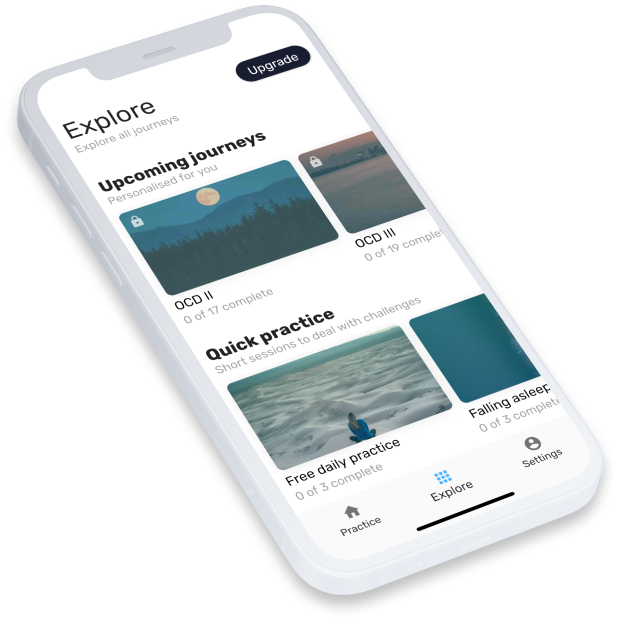The app is based on the core principles of CBT. While not being a “therapy” or “treatment” in itself, It directly targets the person’s thought patterns.
Break negative thinking habits, embrace positive change and explore over 1000+ exercises.

FAQ for OCD.app
What is OCD.app?
OCD.App is a digital platform designed to support individuals managing Obsessive-Compulsive Disorder (OCD). It provides resources, tools, and techniques to help users understand their condition, manage symptoms, and work towards recovery.
Can OCD.app replace therapy?
While OCD.app offers valuable resources and support for managing OCD, it is not a replacement for professional therapy. The app is designed to complement therapy by providing additional tools and support outside of therapy sessions. If you are experiencing severe OCD symptoms, it is important to seek help from a qualified mental health professional.
How can OCD.app help me manage my inner monologue?
OCD.app provides techniques and exercises aimed at helping you manage your inner monologue. These include engagement with thoughts, mindfulness exercises, cognitive behavioral techniques, and game-like interactions. By practicing these techniques regularly, you can gain more control over your thoughts and reduce the impact of intrusive thoughts on your daily life.
What should I do if I have negative thoughts?
Having negative thoughts is a common experience for individuals with OCD. OCD.app offers strategies to help you address and manage these thoughts, such as:
- Identifying and challenging negative thought patterns.
- Practicing mindfulness to stay present and reduce the power of negative thoughts.
- Using exposure and response prevention techniques to gradually reduce the fear and anxiety associated with these thoughts.
It’s important to remember that managing negative thoughts is a skill that takes time and practice. Be patient with yourself and consistent in your practice.
Can the app help me understand my triggers?
Yes, OCD.app includes features that can help you identify and understand your triggers. By tracking your symptoms and the circumstances in which they occur, you can start to recognize patterns and triggers for your OCD. This awareness can be a powerful tool in managing your condition, as it allows you to prepare and apply coping strategies more effectively.
Is there a community aspect to OCD.app?
Yes! Our Community Toolbox feature allows people like you to share their negative and supportive thoughts, browse other people’s thoughts and add them to their personal toolbox. It’s a great way to help others and get help from others – while staying completely anonymous.
How often should I use OCD.app?
The app is designed to be used daily, in short 3-4 minute sessions.
After completing your initial track, you can switch to low intensity use of 1-2 times per week.
Is OCD.app suitable for everyone with OCD?
OCD.App is designed to be a supportive resource for individuals with OCD. However, the effectiveness and suitability of the app can vary depending on the individual’s specific symptoms, severity of condition, and personal preferences. It’s always recommended to consult with a mental health professional to determine the best approach to managing your OCD.
How do I start using OCD.app?
Getting started with OCD.App involves:
- Download the app from your device’s app store
- Launch the app
- Complete onboarding and personalization (1-2 minutes)
- Exercise daily
- Explore the various tools, resources, and community features available to you
For more specific questions or technical support, refer to the app’s help section or contact the support team directly.
Research has shown that using the app for at least 14 days can build supportive thinking, reduce maladaptive beliefs and increase resilience.
Similarly to CBT, these effects are proven to be lasting. In one study, using the app for 14 days has built resilience that lasted for at least 30 days, even without using the app after the initial 14 days.
OCD modules in the app
OCD I (Basic)
Self assessment
Embracing and believing in change
Cope with threat
OCD III (Advanced)
Uncertainty
Perfectionism
Confidence in memory
OCD III (Expert)
Fear of contamination
Fear of harm
Fear of abandonment and trusting
How do I start?
We created an easy to download and use app that utilizes the latest mobile and big data technology.
- Download the app
- Complete the tutorial. It will guide you through the main principles of the app.
- Personalize based on your goals, age and gender
- Form a healthy habit by training daily
- Important! Don’t use the app when you have compulsions. The app should not be used to seek reassurances in times of need. Instead, use it first thing in the morning or before going to bed
- When you gain confidence, improve your access to helpful thinking and acquire supportive thinking patterns, you can keep using the app on a regular basis – for example twice a week
- Tell us about your story, and share your success with others
Depression
Self assessment
Embracing and believing in change
Cope with threat
Relationship OCD
Fear of thoughts
Distrust
Embarrassment
PTSD / Trauma
Belief in change
Dangerous world
Self-trust
Attachment anxiety
Articles about OCD
-

OCD During the Holiday Season: Understanding Patterns, Triggers, and Resilience
Living with OCD during the Holidays: Ruth’s Story I never realized how different my holiday anxiety was until that Christmas…
·
-

Self-Diagnosis of OCD: Benefits, Risks, and Considerations
Introduction Obsessive-Compulsive Disorder (OCD) is a complex mental health condition that affects millions of people worldwide. With increased access to…
-

The Connection Between OCD and a Healthy Lifestyle: How the BetterTogether App Can Help
This post is part of a cross-promotion with Better together app. Obsessive-Compulsive Disorder (OCD) is a mental health condition characterized…
·
-

Understanding and Overcoming “Not Just Right” Feelings in OCD
What Are “Not Just Right” Feelings in OCD? “Not just right” (NJR) feelings are a common experience for individuals with…
-

Mind Traps: Unveiling the Harm Obsessions in OCD
Obsessive-Compulsive Disorder (OCD) is often characterized by intense, persistent fears and compulsions that are rooted in maladaptive beliefs about harm.…
-

Beyond the Surface: Exploring the Depths of Contamination in OCD
What is OCD with a Fear of Contamination? Obsessive-Compulsive Disorder (OCD) is a common, chronic mental health condition characterized by…
-

Understanding OCD Through the Lens of Perfectionism and Memory Beliefs
Obsessive-Compulsive Disorder (OCD) is a mental health condition marked by unwanted thoughts (obsessions) and repetitive behaviors (compulsions). These actions are…
-

Breaking the Cycle: A Cognitive Approach to Overcoming OCD
Obsessive-Compulsive Disorder (OCD) is a mental health condition characterized by persistent, unwanted thoughts (obsessions) and repetitive behaviors or mental acts…
-

Breaking Free from OCD: A Cognitive Approach to Understanding and Managing Obsessive-Compulsive Disorder
What is OCD? Obsessive-Compulsive Disorder (OCD) is a mental health condition characterized by unwanted, intrusive thoughts (obsessions) and repetitive behaviors…
-

Exploring the Concept of Doubt in OCD: A Cognitive Behavioral Therapy Perspective
Key Points Introduction Doubt is a core symptom and cognitive theme in Obsessive-Compulsive Disorder (OCD), presenting unique challenges and impacting…
-

Exploring the Debate: Is “Pure O” OCD a Distinct Diagnosis?
Imagine we’re sitting down over a cup of coffee, and I start talking about a topic close to my heart—Obsessive-Compulsive…
·

